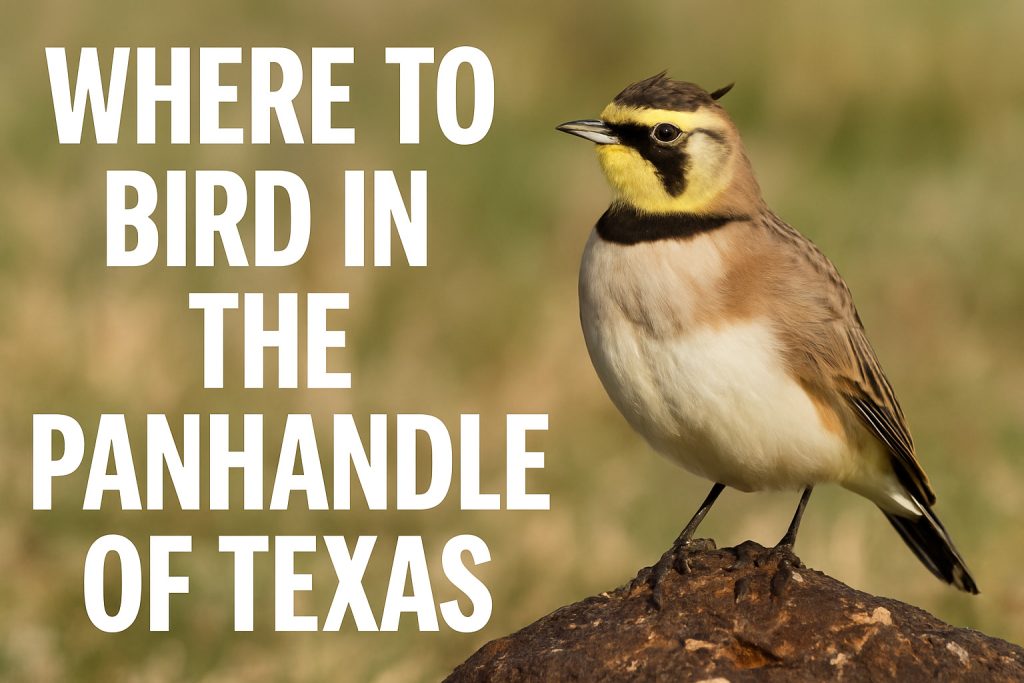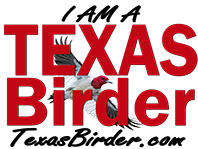
Before you grab your binocs and chase that next lifer, just a quick note: this list highlights some of the most popular birding locations in the region, with only the basics to get you started. Think of it as a beginner’s guide for your next birdy road trip. We’re working on adding even more locations, juicy details, seasonal tips, and probably a few “you had to be there” birder stories. And hey—if you’re out exploring Texas, keep an eye out for Michael in the Texas Birder camper. He’s crisscrossing the state one birding hotspot at a time, likely parked under a tree with a notebook, a camera, and an opinion about vireos.
The Texas Panhandle doesn’t always make the front page of flashy birding trip guides. It’s flat. It’s windy. It smells like cows sometimes.
But let me tell you a secret.
If you’re after Ferruginous Hawks, Lesser Prairie-Chickens, and wide-open skies packed with migrants, the Panhandle will change your tune faster than a Lark Bunting in breeding season.
From dramatic canyons to quiet playas, here’s where to bird in the Texas Panhandle—and why you should be booking your next trip before the prairie wind blows you away.
1. Palo Duro Canyon State Park
Location: Southeast of Amarillo, near Canyon, TX
Habitat: Mesquite brush, red rock cliffs, riparian corridors
Birding Highlights:
- Canyon Towhees skulking around picnic areas
- Golden-fronted and Ladder-backed Woodpeckers arguing over tree rights
- Mississippi Kites soaring like they own the place
- Wild Turkeys that will absolutely photobomb your day
Why Go:
It’s the second-largest canyon in the U.S., and birds love the elevation shifts as much as hikers do. Between the cliffs, cottonwoods, and scrub, you get a fantastic mix of species—and a great excuse to catch your breath.
2. Buffalo Lake National Wildlife Refuge
Location: 30 minutes southwest of Amarillo
Habitat: Shortgrass prairie, marshes, old lakebed
Birding Highlights:
- Ferruginous Hawks and Swainson’s Hawks cruising the prairie
- Burrowing Owls popping up like feathery jack-in-the-boxes
- Loads of shorebirds in spring and fall
- Black-tailed Prairie Dogs giving you the stink-eye
Why Go:
This NWR might be “off the beaten path,” but it’s a raptor and shorebird hotspot with miles of open space and no crowds. Plus, where else can you scan for Long-billed Curlew while a prairie dog watches judgmentally?
3. Lake Meredith National Recreation Area
Location: About 40 miles north of Amarillo
Habitat: Reservoir, canyons, mesquite scrub
Birding Highlights:
- Western and Clark’s Grebes nesting on the water
- Bald Eagles and Ospreys fishing in the coves
- Canyon Wrens giving concerts on the cliffs
- American White Pelicans gliding through like oversized ghosts
Why Go:
One of the few places in the Panhandle where water meets rock, and the birds love the combination. Plus, the views are excellent, and you might get a whole trail to yourself.
4. Muleshoe National Wildlife Refuge
Location: Bailey County, west of Lubbock
Habitat: Playa lakes, prairie grassland
Birding Highlights:
- Sandhill Cranes by the thousands (yes, thousands)
- Long-billed Curlews strutting like runway models
- Northern Harriers gliding low and silent over the grass
- Say’s Phoebes wagging tails like they’re trying to start something
Why Go:
It’s one of the oldest National Wildlife Refuges in Texas, and it’s still a prime destination during crane season. If you haven’t stood on a chilly Panhandle morning and listened to the roar of 20,000 cranes, have you even birded?
5. Rita Blanca National Grasslands
Location: Dallam County, near Dalhart
Habitat: Prairie, scattered trees, dry playas
Birding Highlights:
- Cassin’s and Grasshopper Sparrows
- Scaled Quail and Northern Bobwhite
- Horned Larks and Lark Buntings doing their prairie thing
- Possible Golden Eagles, because the prairie has surprises
Why Go:
This is big sky birding. It’s quiet, remote, and full of grassland specialists you won’t find in other parts of the state. Pro tip: bring a spotting scope, a full tank of gas, and your best patience.
6. Thompson Park (Amarillo)
Location: Right in Amarillo
Habitat: Urban park, lakes, mature trees
Birding Highlights:
- Black-crowned Night Herons pretending to be statues
- Yellow-headed Blackbirds (in season)
- Cormorants drying out like feathered laundry
- Lots of surprises during spring migration
Why Go:
Urban birding, yes—but surprisingly birdy. Great for waterfowl, migratory songbirds, and catching a break without leaving the city.
7. Canadian River Valley
Location: Following the river northeast of Amarillo
Habitat: Riparian areas, cliffs, rolling prairie
Birding Highlights:
- Eastern Bluebirds and orioles during spring
- Sparrows galore in winter
- Nesting raptors and Great Horned Owls
- Belted Kingfishers treating it like their personal highway
Why Go:
It’s a lesser-known gem with big rewards for those who slow down and explore. The scenery alone makes it worth the drive.
Final Thoughts: Birds, Sky, and Solitude
The Texas Panhandle is for birders who love open space, subtle beauty, and the thrill of the unexpected. You won’t find boardwalk crowds or feeder frenzies—but you will find quiet, dramatic landscapes and birds that reward persistence.
Bring a scope. Bring sunscreen. Bring your sense of humor (and possibly a windbreaker).
Because up here, the birds are waiting—and the views go on forever.

More Stories
Top Ten Best Places to Bird in Texas During September
Birding at Davis Mountains State Park in August: Cool Nights, Hot Days, and Surprising Birds
Where to Bird Near Dallas: Top Spots for Urban Birders and Wild Escapes